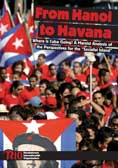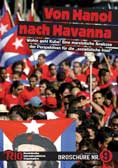




 FRANCEBURNING
FRANCEBURNING
Blockades, factory occupations, mass strikes – what can we learn from the class struggle in France?
International Seminar: Saturday, January 8, 2:00-8:00pm
Mehringhof, Gneisenaustr. 2a, U6/U7 Mehringdamm, Berlin »»»»
 (0)
(0)
 FRANKREICHBRENNT
FRANKREICHBRENNT
Blockaden, Betriebsbesetzungen, Massenstreiks – was können wir aus dem Klassenkampf in Frankreich lernen?
internationales Seminar: Samstag, 8. Januar, 14-20 Uhr
Mehringhof, Gneisenaustr. 2a, U6/U7 Mehringdamm, Berlin »»»»
Making Cuba more like Vietnam
No Translations
WordPress database error: [You have an error in your SQL syntax; check the manual that corresponds to your MariaDB server version for the right syntax to use near '' at line 1]SELECT synonym, sanitised, description FROM wp_irevoterm2syn WHERE term_id = 1 AND language_id =

 Raúl Castro has announced that the much-delayed congress of the Communist Party of Cuba (PCC) will take place in April 2011. The fifth congress of the PCC was held in October 1997, and the sixth has been postponed countless times. But after an interval of thirteen and a half years, the PCC’s (formally) highest body will finally meet. »»»»
Raúl Castro has announced that the much-delayed congress of the Communist Party of Cuba (PCC) will take place in April 2011. The fifth congress of the PCC was held in October 1997, and the sixth has been postponed countless times. But after an interval of thirteen and a half years, the PCC’s (formally) highest body will finally meet. »»»»

 Raúl Castro hat bekannt gegeben, dass der oft verzögerte Kongress der Kommunistischen Partei Kubas (PCC) nun im April 2011 stattfinden wird. Der fünfte Kongress der PCC wurde im Oktober 1997 abgehalten, und der sechste ist unzählige Male verschoben worden. Aber nach einem Zeitraum von 13,5 Jahren wird sich das (formell) höchste Organ der PCC schließlich treffen. »»»»
Raúl Castro hat bekannt gegeben, dass der oft verzögerte Kongress der Kommunistischen Partei Kubas (PCC) nun im April 2011 stattfinden wird. Der fünfte Kongress der PCC wurde im Oktober 1997 abgehalten, und der sechste ist unzählige Male verschoben worden. Aber nach einem Zeitraum von 13,5 Jahren wird sich das (formell) höchste Organ der PCC schließlich treffen. »»»»

 Where is Cuba Going? A Marxist Analysis of the Perspectives for the “Socialist Island”
Where is Cuba Going? A Marxist Analysis of the Perspectives for the “Socialist Island”
Cuba seems like an anachronism in today’s world. Other formerly “socialist” states reintroduced capitalism in the upheavals of the 1990s. In Russia, the Communist Party was toppled and its system collapsed. In China and Vietnam, the Communist Parties themselves led a controlled process of reforms to reestablish a market economy. Cuba alone has maintained to this day an economy which is dominated not by the laws of the market but by a plan. Will Cuba experience a chaotic reintroduction of capitalism like in Russia? Or a controlled restoration like in China and Vietnam? Will it remain an “anachronism”? Or will it develop in an entirely new direction?
Introduction and Chapter 1: Cuba today
Chapter 2: The Cuban Revolution
Chapter 3: From olive green to red
Infobox: The Cuban Revolution began in 1917…
Chapter 4: Cuban Bonapartism
Chapter 5: A degenerate workers’ state
Chapter 6: The “Special Period”
Chapter 7: Stabilization
Chapter 8: The military, the bureaucracy and the party
Chapter 9: The development of the economy
Chapter 10: The trajectory of the Cuban regime
Chapter 11: The “Chinese” road
Chapter 12: Three possible roads
Chapter 13: Tasks of Marxists + Bibliography
The first draft of these theses was written by Wladek Flakin (RIO, Berlin) in April 2010 and discussed at RIO’s seminar on Latin America in June 2010 and its Summer Academy in August 2010. Based on these discussions the text was expanded by Victor Jalava (RIO, Kiel). Members of the Left Block (LiBRo) from Rostock, the Marxist Initiative (MI) from Berlin and the New Anticapitalist Left (NAL) from the Czech Republic contributed to the discussion. Following, we will publish one chapter from the theses every two days for a month.

 Wohin geht Kuba? Eine marxistische Analyse der Perspektiven für die “sozialistische Insel”
Wohin geht Kuba? Eine marxistische Analyse der Perspektiven für die “sozialistische Insel”
Kuba wirkt wie ein Anachronismus in der heutigen Welt. Andere ehemals “sozialistische” Staaten führten den Kapitalismus während der Umwälzungen der 1990er Jahre wieder ein. In Russland wurde die Kommunistische Partei gestürzt und ihr System brach zusammen. In China und Vietnam waren es die Kommunistischen Parteien selbst, die einen kontrollierten Reformprozess zur Wiederherstellung einer Marktwirtschaft durchführten. Nur Kuba hat bis heute eine Wirtschaft aufrechterhalten, die nicht den Gesetzen des Marktes, sondern einem Plan unterworfen ist. Wird Kuba eine chaotische Wiedereinführung des Kapitalismus wie in Russland erleben? Oder eine kontrollierte Restauration wie in China und Vietnam? Wird Kuba ein “Anachronismus” bleiben? Oder wird es einen ganz anderen Weg einschlagen?
Einleitung und Kapitel 1: Kuba heute
Kapitel 2: Die kubanische Revolution
Kapitel 3: Von Olivgrün zu Rot
Infokasten: Die kubanische Revolution begann im Jahr 1917…
Kapitel 4: Kubanischer Bonapartismus
Kapitel 5: Ein degenerierter ArbeiterInnenstaat
Kapitel 6: Die “Sonderperiode”
Kapitel 7: Stabilisierung
Kapitel 8: Das Militär, die Bürokratie und die Partei
Kapitel 9: Die Entwicklung der Wirtschaft
Kapitel 10: Die Laufbahn des kubanischen Regimes
Kapitel 11: Der “chinesische” Weg
Kapitel 12: Drei mögliche Wege
Kapitel 13: Aufgaben für MarxistInnen + Quellen und Literatur
Erhältlich für 2 Euro von der deutschen Sektion von RIO.
Der erste Entwurf für diese Thesen wurde von Wladek Flakin (RIO, Berlin) im April 2010 verfasst und beim Lateinamerika-Seminar im Juni 2010 und bei der Sommerakademie im August 2010 diskutiert. Auf der Grundlage dieser Diskussionen wurde der Text von Victor Jalava (RIO, Kiel) erweitert. An der Diskussion beteiligten sich Mitglieder des Linken Block Rostocks (LiBRo), der Marxistischen Initiative (MI) aus Berlin und der Neuen Antikapitalistischen Linken (NAL) aus der Tschechischen Republik. Im Folgenden veröffentlichen wir im nächsten Monat alle zwei Tage ein Kapitel der Thesen.

 Revolutionäre MarxistInnen außerhalb Kubas haben mehrere grundsätzliche Aufgaben. Wir müssen die Errungenschaften der kubanischen Revolution gegen den Imperialismus verteidigen und v. a. gegen die verbrecherische US-Blockade der Insel protestieren. Gleichzeitig müssen wir diese Errungenschaften gegen die herrschende Bürokratie verteidigen, wenn sie weitere Schritte Richtung Kapitalismus zu unternehmen versucht. Dazu müssen wir die einzige denkbare soziale Basis einer zweiten kubanischen Revolution stärken, eine unabhängige ArbeiterInnenbewegung auf der Insel. »»»»
Revolutionäre MarxistInnen außerhalb Kubas haben mehrere grundsätzliche Aufgaben. Wir müssen die Errungenschaften der kubanischen Revolution gegen den Imperialismus verteidigen und v. a. gegen die verbrecherische US-Blockade der Insel protestieren. Gleichzeitig müssen wir diese Errungenschaften gegen die herrschende Bürokratie verteidigen, wenn sie weitere Schritte Richtung Kapitalismus zu unternehmen versucht. Dazu müssen wir die einzige denkbare soziale Basis einer zweiten kubanischen Revolution stärken, eine unabhängige ArbeiterInnenbewegung auf der Insel. »»»»

 Revolutionary Marxists outside Cuba have several fundamental tasks. We must defend the gains of the Cuban revolution against imperialism, particularly opposing the criminal US blockade of the island. At the same time, we must defend these gains against the plans of the ruling bureaucracy itself when it tries to take further steps towards capitalism. For this, we must strengthen the only conceivable social base of a second Cuban Revolution, an independent workers’ movement on the island. »»»»
Revolutionary Marxists outside Cuba have several fundamental tasks. We must defend the gains of the Cuban revolution against imperialism, particularly opposing the criminal US blockade of the island. At the same time, we must defend these gains against the plans of the ruling bureaucracy itself when it tries to take further steps towards capitalism. For this, we must strengthen the only conceivable social base of a second Cuban Revolution, an independent workers’ movement on the island. »»»»

 Los Marxistas revolucionarios fuera de Cuba tenemos varias tareas fundamentales. Debemos defender las conquistas de la revolución cubana contra el imperialismo, en particular oponerse política y materialmente al criminal bloqueo de EE.UU. de la isla. Al mismo tiempo, tenemos que defender estos avances contra los planes de la burocracia gobernante que trata de dar nuevos pasos hacia el capitalismo. Para ello, debemos fortalecer la única base social concebible de una segunda Revolución Cubana, un movimiento de trabajadores independientes en la isla y alentar la solidaridad a nivel de base de los trabajadores latinoamericanos y a nivel internacional con los trabajadores cubanos por sobre las cúpulas reformistas o estalinistas. »»»»
Los Marxistas revolucionarios fuera de Cuba tenemos varias tareas fundamentales. Debemos defender las conquistas de la revolución cubana contra el imperialismo, en particular oponerse política y materialmente al criminal bloqueo de EE.UU. de la isla. Al mismo tiempo, tenemos que defender estos avances contra los planes de la burocracia gobernante que trata de dar nuevos pasos hacia el capitalismo. Para ello, debemos fortalecer la única base social concebible de una segunda Revolución Cubana, un movimiento de trabajadores independientes en la isla y alentar la solidaridad a nivel de base de los trabajadores latinoamericanos y a nivel internacional con los trabajadores cubanos por sobre las cúpulas reformistas o estalinistas. »»»»

 El último congreso del PCC fue en 1997. El sexto congreso fue previsto inicialmente para 2008, se ha aplazado indefinidamente. Conociendo como opera la maquinaria estalinista de los partidos comunistas, este es un signo seguro de grietas dentro de la burocracia, que la dirección está trabajando para repararlas antes de que puedan aparecer en un congreso. »»»»
El último congreso del PCC fue en 1997. El sexto congreso fue previsto inicialmente para 2008, se ha aplazado indefinidamente. Conociendo como opera la maquinaria estalinista de los partidos comunistas, este es un signo seguro de grietas dentro de la burocracia, que la dirección está trabajando para repararlas antes de que puedan aparecer en un congreso. »»»»

 Der letzte Kongress der PCC war im Jahr 1997. Der sechste Kongress, der ursprünglich für 2008 geplant war, wurde auf unbestimmte Zeit verschoben. Das ist ein klares Zeichen, dass es Risse innerhalb der Bürokratie gibt, die die oberste Führung flicken will, bevor sie sich auf einem Kongress zeigen. »»»»
Der letzte Kongress der PCC war im Jahr 1997. Der sechste Kongress, der ursprünglich für 2008 geplant war, wurde auf unbestimmte Zeit verschoben. Das ist ein klares Zeichen, dass es Risse innerhalb der Bürokratie gibt, die die oberste Führung flicken will, bevor sie sich auf einem Kongress zeigen. »»»»

